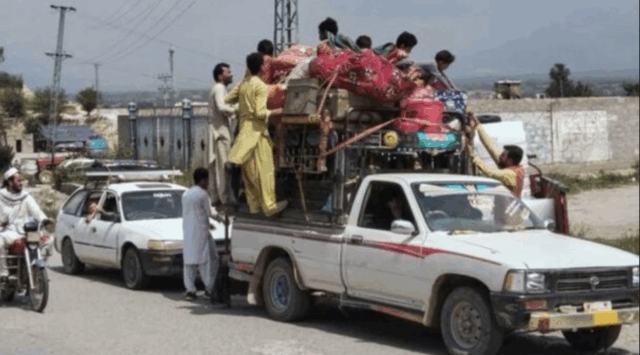
Pakistan’s Operation Sarbakaf Against TTP Angers Locals
By:

Executive Summary:
- Operation Sarbakaf, Pakistan’s latest offensive against Afghanistan-based Tehrik-e-Taliban Pakistan (TTP) militants in Bajaur, has triggered significant local opposition and displacement, undermining its effectiveness.
- Provincial resistance from Khyber Pakhtunkhwa’s leadership and the failure of tribal negotiations highlight deep political divides over how to counter the TTP.
- Civilian casualties and mass displacement threaten to erode public support for counterterrorism efforts in the region, risking further instability in Pakistan’s northwest.
On September 6, at least one person was killed in a bomb blast during a cricket match in Pakistan’s Bajaur District (Urdu: ضلع باجوڑ) in northwestern Khyber Pakhtunkhwa (Urdu: خیبر پختونخوا), province. The attack was carried out by militants in retaliation for Operation Sarbakaf (Urdu: آپریشن سربکاف, ”Operation Fearless Unto Death”). This operation is being launched against Afghanistan-based militants by Pakistani security forces in Bajaur (Dawn, September 6).
Background on Operation Sarbakaf
On July 30, the Pakistan Army launched Operation Sarbakaf, a major counterterrorism offensive against Tehreek-e-Taliban Pakistan (Urdu: تحریکِ طالبان پاکستان, TTP) militants. Backed by gunship helicopters and artillery, the offensive was launched after a curfew was first imposed in Bajaur (Dawn, July 30). The district shares a border with Afghanistan’s Kunar (Dari: کنر) Province.
For Afghanistan-based militant groups, Bajaur serves as a strategic base to carry out operations against targets inside Pakistan (BBC Urdu, July 30). Before Operation Sarbakaf was launched, TTP militants had increased attacks on Pakistani security forces and targeted political figures in Khyber Pakhtunkhwa, including Maulana Khan Zeb (Urdu/Pashto: خان زیب), an Islamic scholar, peace activist, and leader of the Awami National Party (Urdu: عوامی نيشنل پارٹی, ANP). He was shot dead in Bajaur on July 10 (Dawn, July 10).
Failed Negotiations
Pakistan’s central government in Islamabad and its provincial government of Khyber Pakhtunkhwa disagree over Operation Sarbakaf. The party of former Prime Minister Imran Khan, Pakistan Tehreek-e-Insaf (Urdu: پاکستان تحريکِ انصاف, PTI), is the ruling party in Khyber Pakhtunkhwa. Khan, currently languishing in jail on corruption charges, is fiercely opposed to any military operation in the province. Chief Minister of Khyber Pakhtunkhwa, Ali Amin Gandapur (Urdu: علی امین گنڈا پور), who has long opposed any military operation in the province, announced the convening of a jirga (Pashto: جرګه, a Pashtun tribal assembly that meets to resolve disagreement), which began on August 2, in order to negotiate with TTP militants in Bajaur. “These terrorists take shelter in populated areas so that when they carry out attacks, a retaliatory strike by our armed forces will cause collateral damage,” Gandapur has claimed (Dawn, July 30).
The Pakistani security establishment told the jirga negotiating with the militants to advance one of two positions: either the militants leave Bajaur, or the local tribes must vacate the area for a military offensive, should the Taliban reject the first option. The security forces assured the tribes they would avoid civilian casualties (of which many would be Afghans who dwell among the locals) during operations against militants (The News, August 9). Negotiations between the jirga and the militants ultimately failed, and the security forces relaunched their operation (Independent Pakistan, August 10).
Local Opposition to Operation Sarbakaf
Operation Sarbakaf faced stiff opposition and criticism from locals from its outset. Tribal and political leaders in Bajaur (and Khyber Pakhtunkhwa as a whole) vehemently condemned the operation and the imposition of a curfew by the Pakistani military (Dawn, July 30). In August, civilian casualties during the operation further fuelled public anger in Bajaur when a mortar killed two children and their mother in a house in Mamond (Urdu/Pashto: ماموند) (Arab News, August 13).
The operation sparked protests where Bajaur residents condemned the military action for increasing the danger of crossfire exchanged between the military and militants. Just a day after the military operation launched, locals took to the streets to protest the ongoing offensive in several areas of the district. Protesters wore black ribbons and held copies of the Quran to express their concerns over the suffering of the local population (Dawn, July 31). As the protesters anticipated, the Bajaur offensive led to the displacement of 25,000 families according to official figures, many of whom fled to government buildings for shelter (Arab News, August 13).
Conclusion
Pakistan still lacks the kind of multi-pronged strategy it needs to make Operation Sarbakaf successful in the country’s tribal areas along the border with Afghanistan. Such a strategy must activate local political, social, and tribal actors to garner support for the offensive against militants in Bajaur and elsewhere in Khyber Pakhtunkhwa. At the same time, Pakistan must effectively secure its borders with Afghanistan and restrict cross-border movement of militants into Pakistan as a central piece of its broader counterterrorism strategy.



